SQL Data Analyst Resume Examples

Jul 18, 2024
|
12 min read
Analyze your way to a standout resume: simple tips for writing a compelling SQL Data Analyst resume that will make your skills shine and get you closer to landing your dream job.
Rated by 348 people
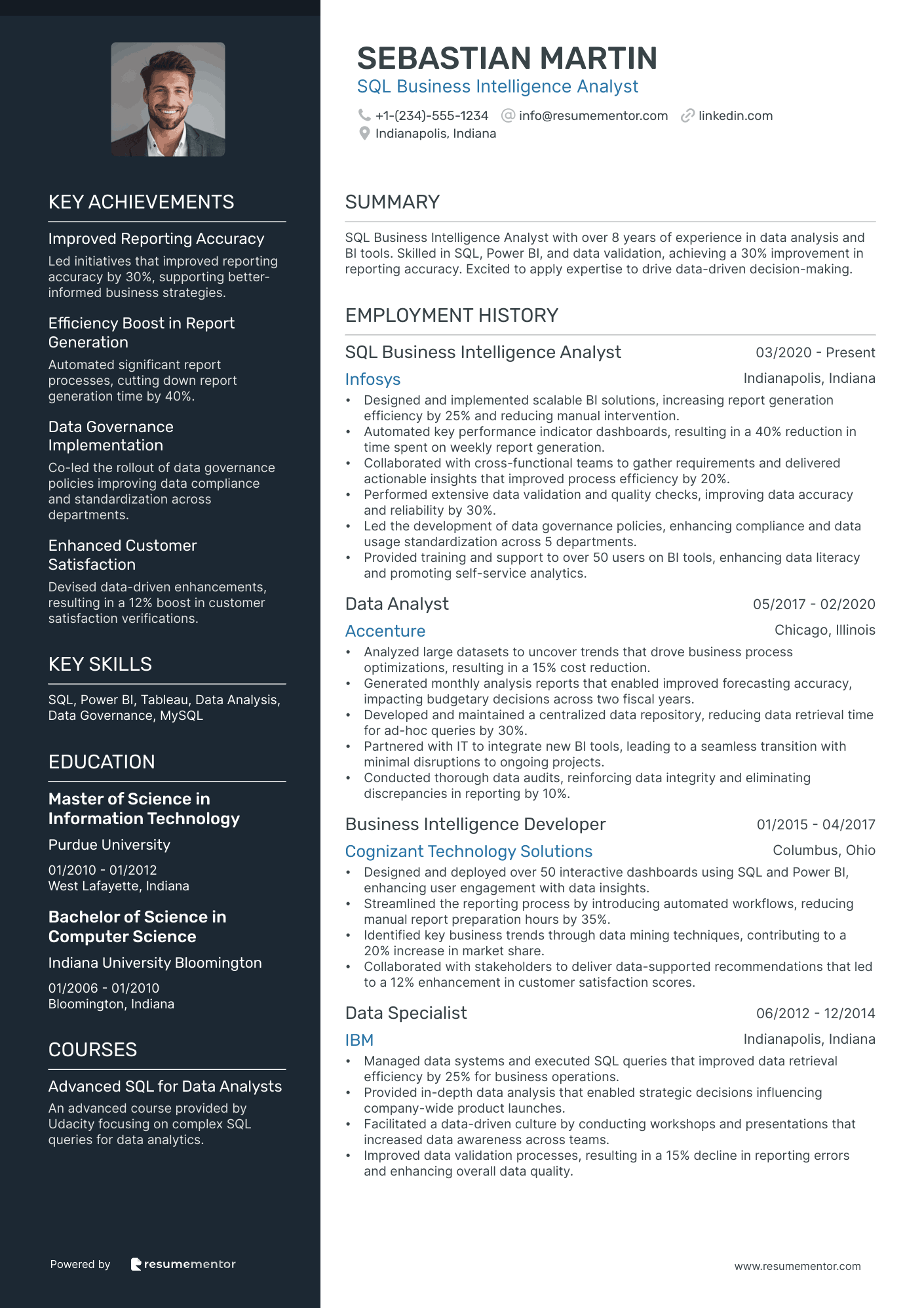
SQL Business Intelligence Analyst
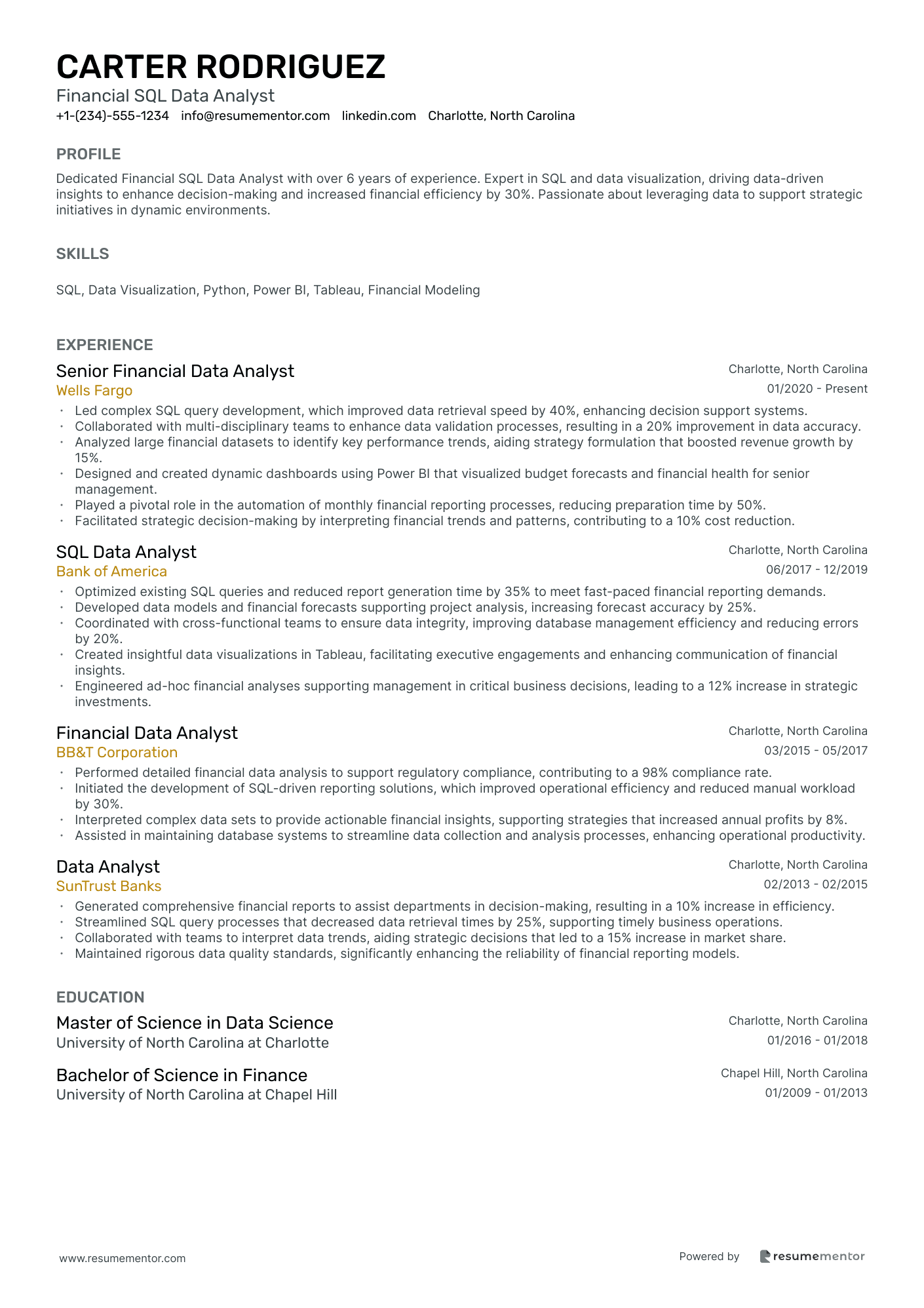
Financial SQL Data Analyst
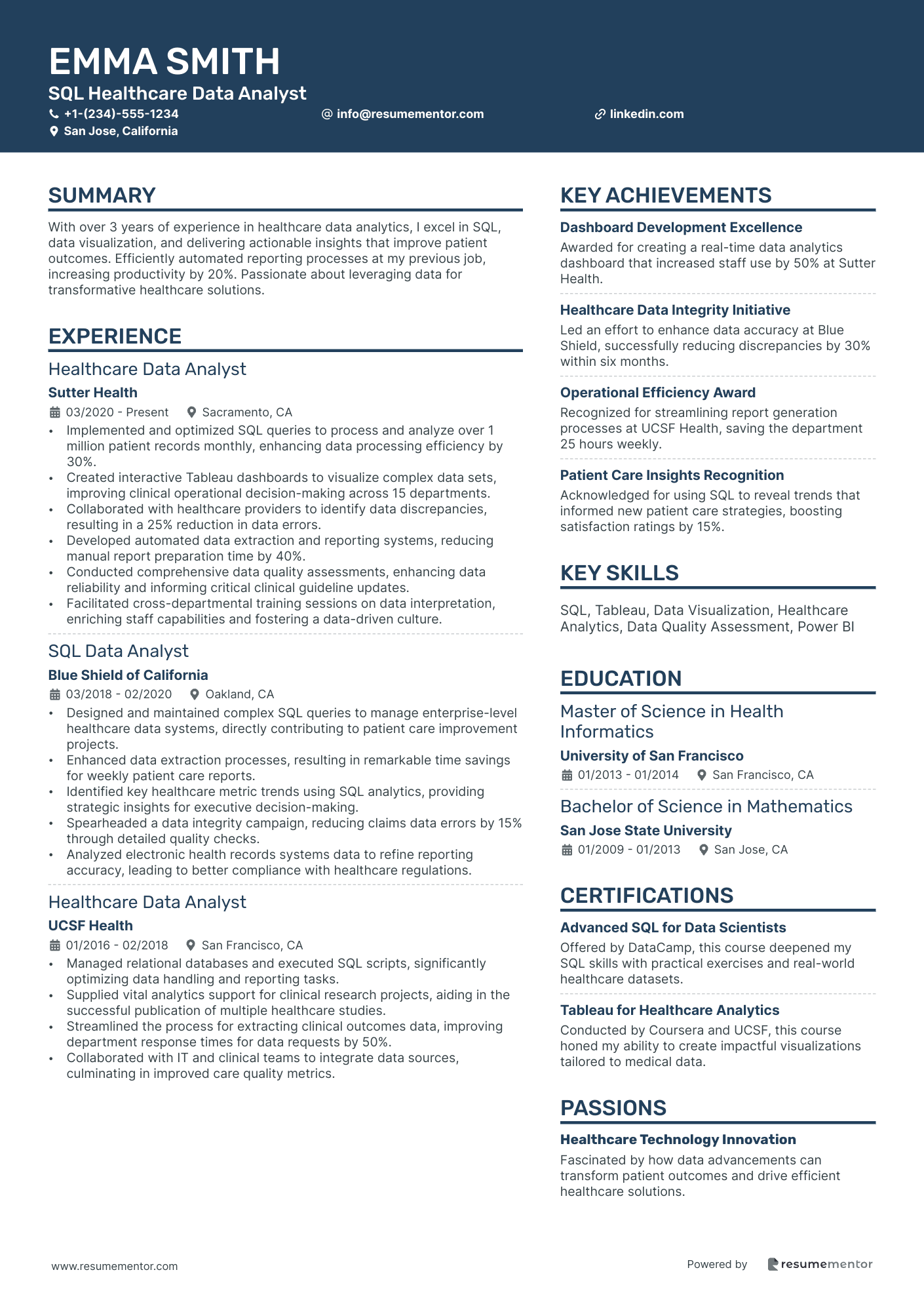
SQL Healthcare Data Analyst
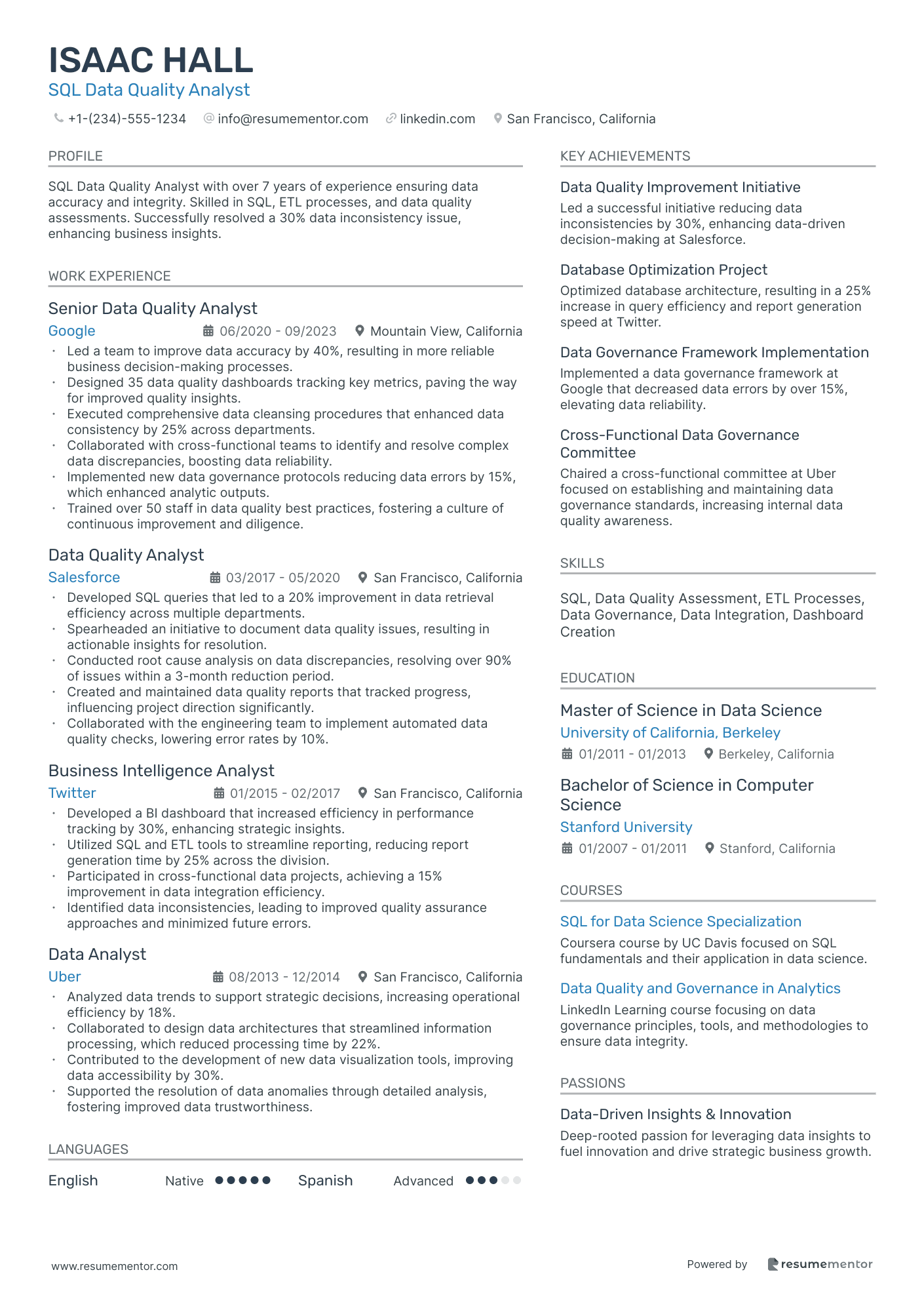
SQL Data Quality Analyst
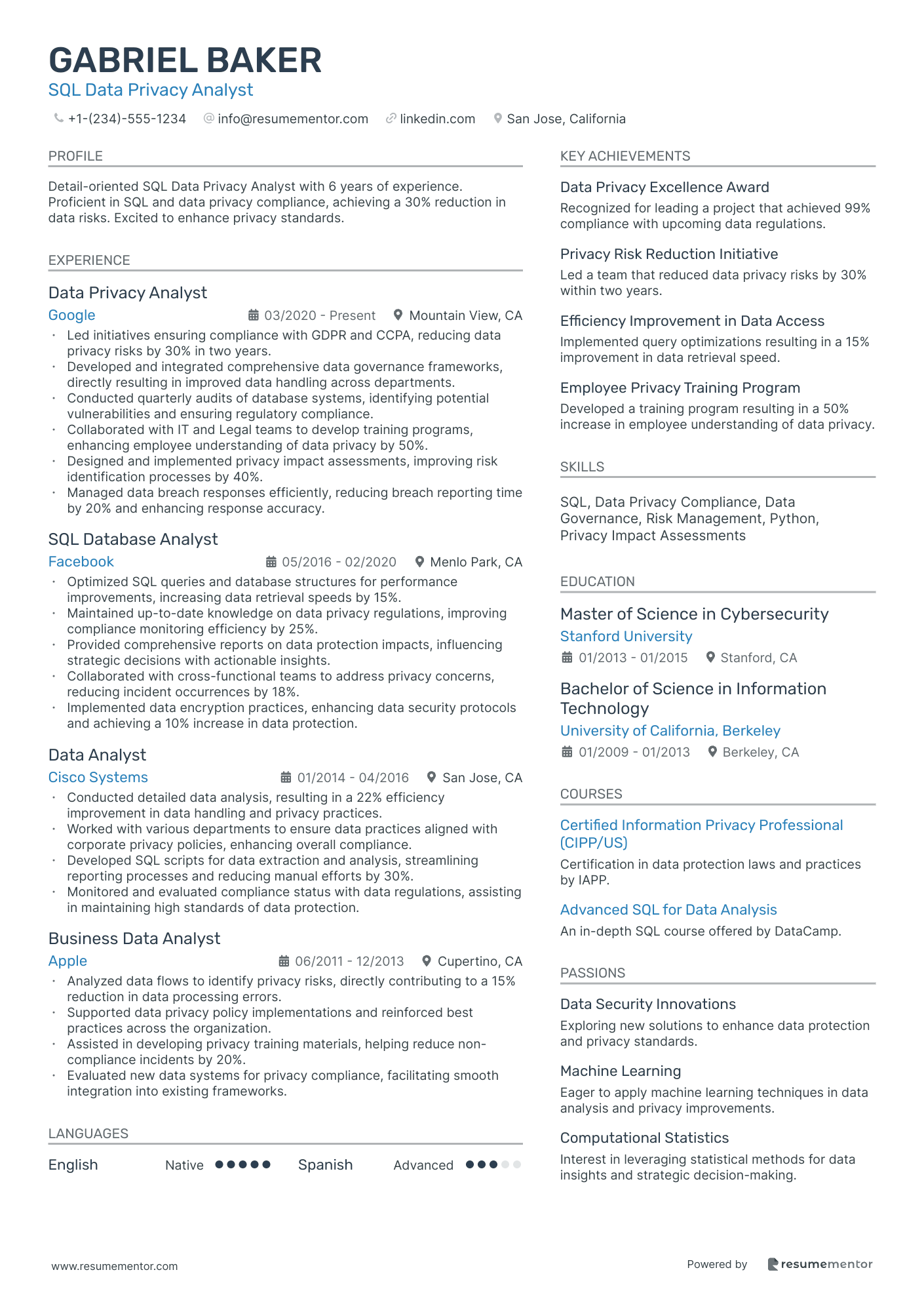
SQL Data Privacy Analyst
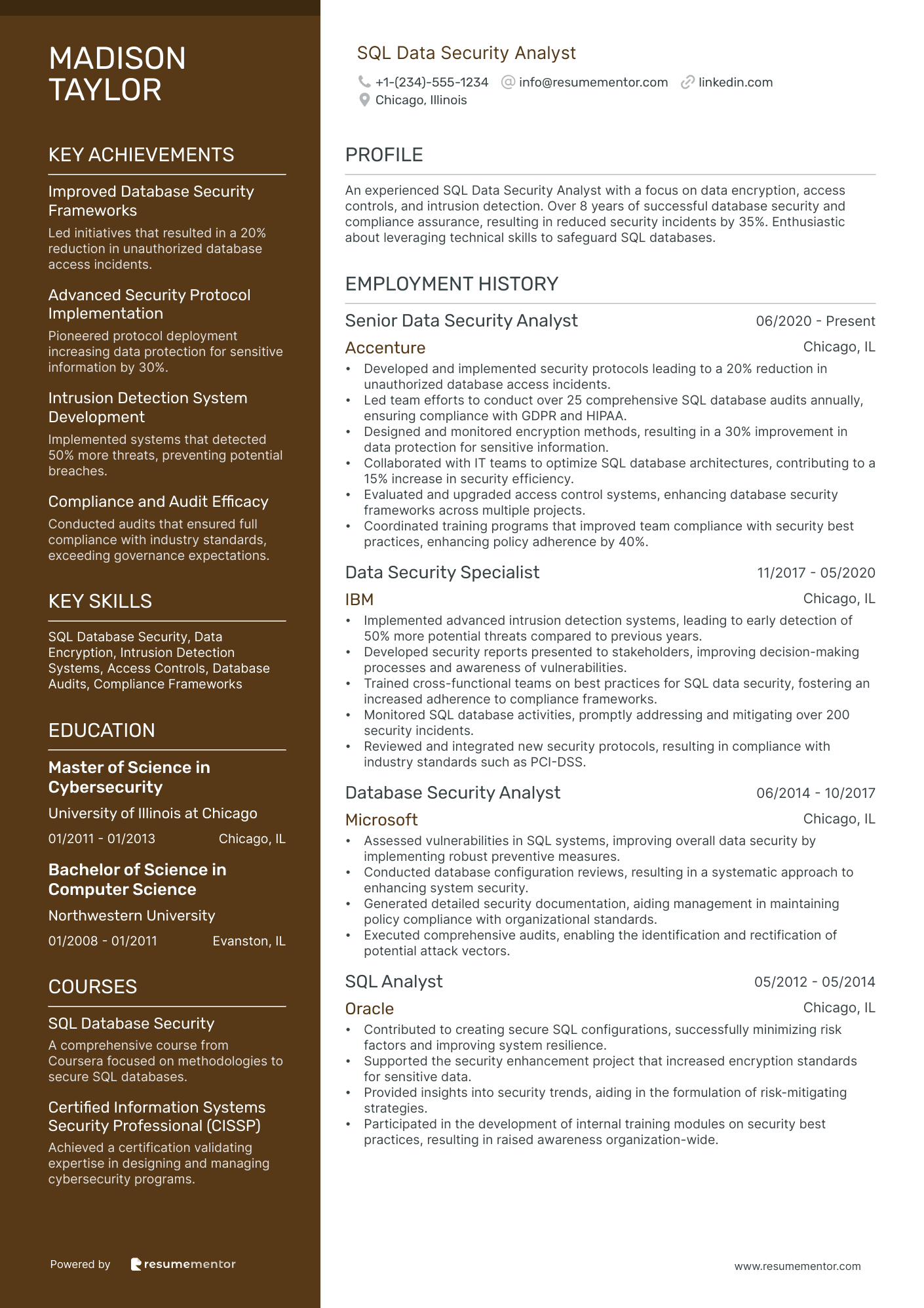
SQL Data Security Analyst
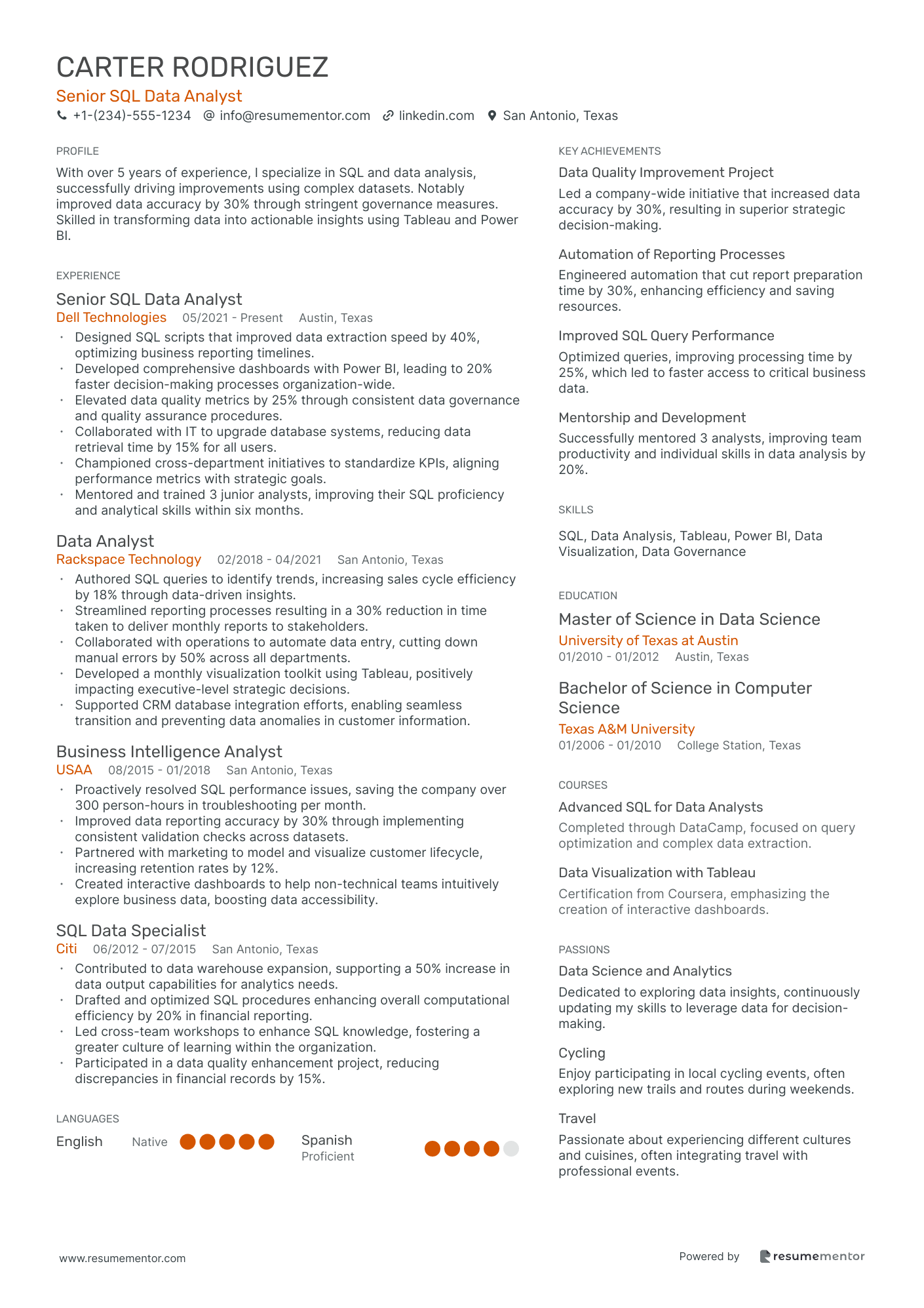
Senior SQL Data Analyst
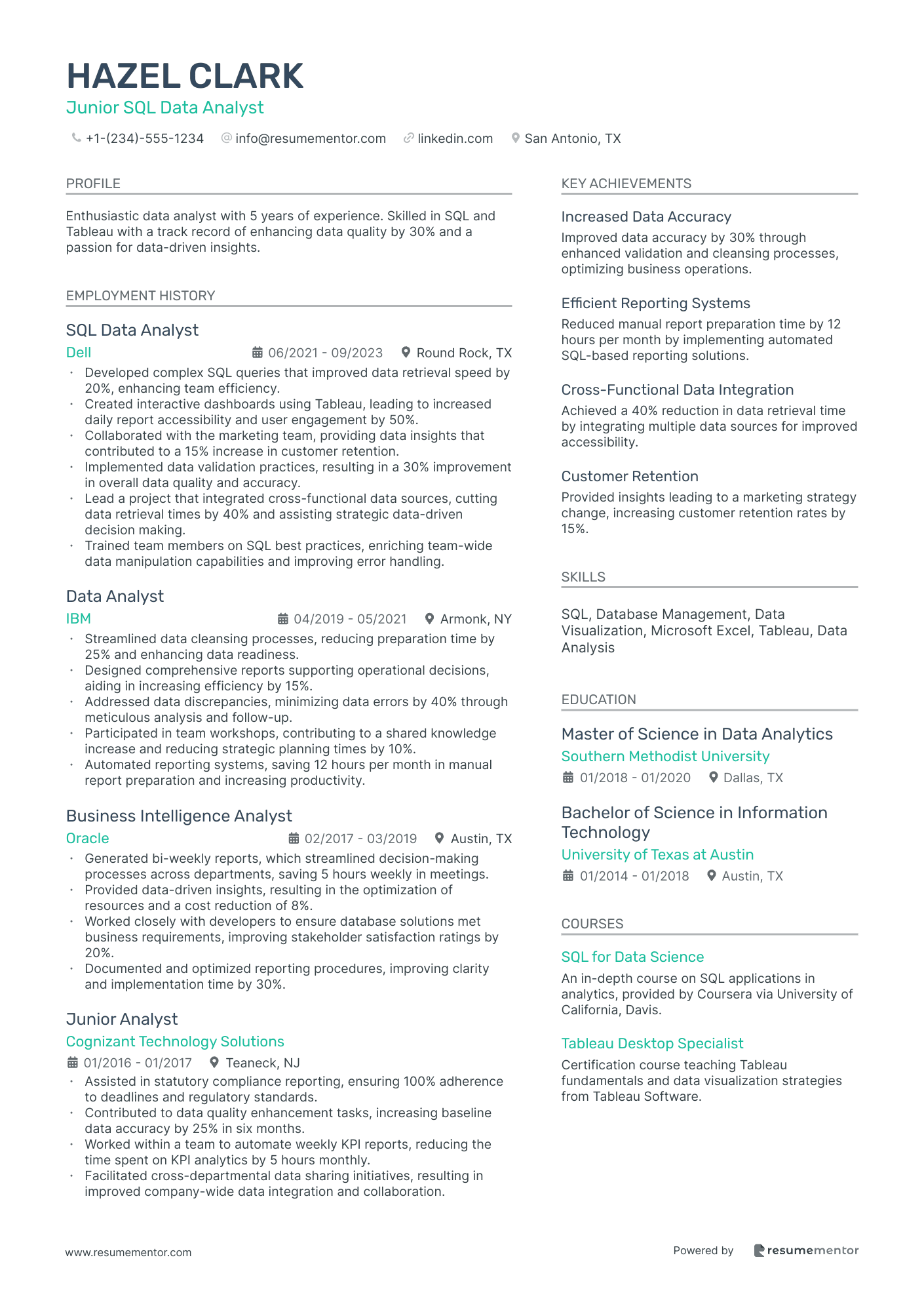
Junior SQL Data Analyst
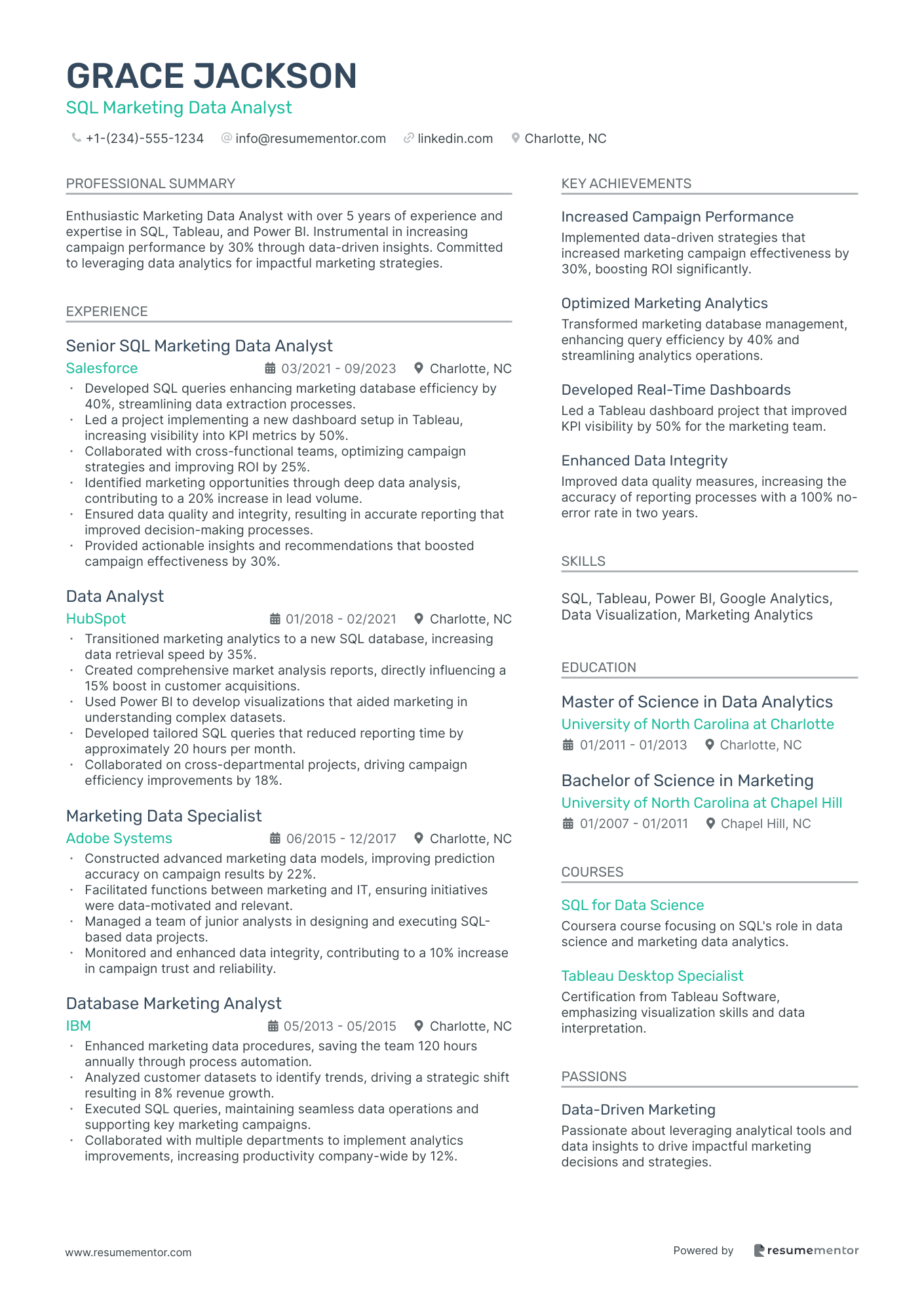
SQL Marketing Data Analyst
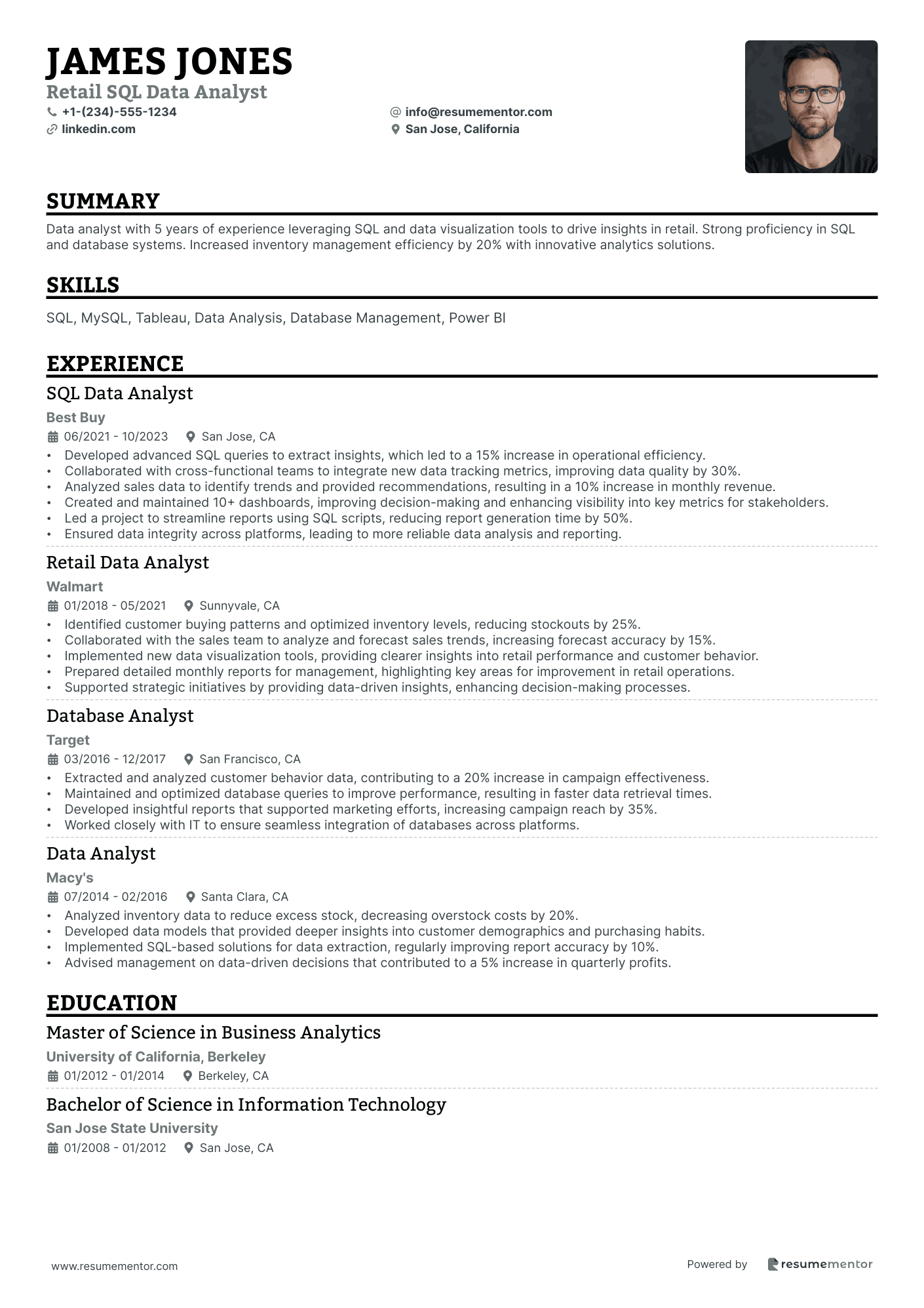
Retail SQL Data Analyst

SQL Business Intelligence Analyst resume sample
- •Designed and implemented scalable BI solutions, increasing report generation efficiency by 25% and reducing manual intervention.
- •Automated key performance indicator dashboards, resulting in a 40% reduction in time spent on weekly report generation.
- •Collaborated with cross-functional teams to gather requirements and delivered actionable insights that improved process efficiency by 20%.
- •Performed extensive data validation and quality checks, improving data accuracy and reliability by 30%.
- •Led the development of data governance policies, enhancing compliance and data usage standardization across 5 departments.
- •Provided training and support to over 50 users on BI tools, enhancing data literacy and promoting self-service analytics.
- •Analyzed large datasets to uncover trends that drove business process optimizations, resulting in a 15% cost reduction.
- •Generated monthly analysis reports that enabled improved forecasting accuracy, impacting budgetary decisions across two fiscal years.
- •Developed and maintained a centralized data repository, reducing data retrieval time for ad-hoc queries by 30%.
- •Partnered with IT to integrate new BI tools, leading to a seamless transition with minimal disruptions to ongoing projects.
- •Conducted thorough data audits, reinforcing data integrity and eliminating discrepancies in reporting by 10%.
- •Designed and deployed over 50 interactive dashboards using SQL and Power BI, enhancing user engagement with data insights.
- •Streamlined the reporting process by introducing automated workflows, reducing manual report preparation hours by 35%.
- •Identified key business trends through data mining techniques, contributing to a 20% increase in market share.
- •Collaborated with stakeholders to deliver data-supported recommendations that led to a 12% enhancement in customer satisfaction scores.
- •Managed data systems and executed SQL queries that improved data retrieval efficiency by 25% for business operations.
- •Provided in-depth data analysis that enabled strategic decisions influencing company-wide product launches.
- •Facilitated a data-driven culture by conducting workshops and presentations that increased data awareness across teams.
- •Improved data validation processes, resulting in a 15% decline in reporting errors and enhancing overall data quality.
Financial SQL Data Analyst resume sample
- •Led complex SQL query development, which improved data retrieval speed by 40%, enhancing decision support systems.
- •Collaborated with multi-disciplinary teams to enhance data validation processes, resulting in a 20% improvement in data accuracy.
- •Analyzed large financial datasets to identify key performance trends, aiding strategy formulation that boosted revenue growth by 15%.
- •Designed and created dynamic dashboards using Power BI that visualized budget forecasts and financial health for senior management.
- •Played a pivotal role in the automation of monthly financial reporting processes, reducing preparation time by 50%.
- •Facilitated strategic decision-making by interpreting financial trends and patterns, contributing to a 10% cost reduction.
- •Optimized existing SQL queries and reduced report generation time by 35% to meet fast-paced financial reporting demands.
- •Developed data models and financial forecasts supporting project analysis, increasing forecast accuracy by 25%.
- •Coordinated with cross-functional teams to ensure data integrity, improving database management efficiency and reducing errors by 20%.
- •Created insightful data visualizations in Tableau, facilitating executive engagements and enhancing communication of financial insights.
- •Engineered ad-hoc financial analyses supporting management in critical business decisions, leading to a 12% increase in strategic investments.
- •Performed detailed financial data analysis to support regulatory compliance, contributing to a 98% compliance rate.
- •Initiated the development of SQL-driven reporting solutions, which improved operational efficiency and reduced manual workload by 30%.
- •Interpreted complex data sets to provide actionable financial insights, supporting strategies that increased annual profits by 8%.
- •Assisted in maintaining database systems to streamline data collection and analysis processes, enhancing operational productivity.
- •Generated comprehensive financial reports to assist departments in decision-making, resulting in a 10% increase in efficiency.
- •Streamlined SQL query processes that decreased data retrieval times by 25%, supporting timely business operations.
- •Collaborated with teams to interpret data trends, aiding strategic decisions that led to a 15% increase in market share.
- •Maintained rigorous data quality standards, significantly enhancing the reliability of financial reporting models.
SQL Healthcare Data Analyst resume sample
- •Implemented and optimized SQL queries to process and analyze over 1 million patient records monthly, enhancing data processing efficiency by 30%.
- •Created interactive Tableau dashboards to visualize complex data sets, improving clinical operational decision-making across 15 departments.
- •Collaborated with healthcare providers to identify data discrepancies, resulting in a 25% reduction in data errors.
- •Developed automated data extraction and reporting systems, reducing manual report preparation time by 40%.
- •Conducted comprehensive data quality assessments, enhancing data reliability and informing critical clinical guideline updates.
- •Facilitated cross-departmental training sessions on data interpretation, enriching staff capabilities and fostering a data-driven culture.
- •Designed and maintained complex SQL queries to manage enterprise-level healthcare data systems, directly contributing to patient care improvement projects.
- •Enhanced data extraction processes, resulting in remarkable time savings for weekly patient care reports.
- •Identified key healthcare metric trends using SQL analytics, providing strategic insights for executive decision-making.
- •Spearheaded a data integrity campaign, reducing claims data errors by 15% through detailed quality checks.
- •Analyzed electronic health records systems data to refine reporting accuracy, leading to better compliance with healthcare regulations.
- •Managed relational databases and executed SQL scripts, significantly optimizing data handling and reporting tasks.
- •Supplied vital analytics support for clinical research projects, aiding in the successful publication of multiple healthcare studies.
- •Streamlined the process for extracting clinical outcomes data, improving department response times for data requests by 50%.
- •Collaborated with IT and clinical teams to integrate data sources, culminating in improved care quality metrics.
- •Developed SQL scripts to analyze patient demographics, helping to identify key areas for targeted healthcare initiatives.
- •Led project to unify disparate patient data systems, enhancing data accessibility for multiple health departments.
- •Provided routine analysis of patient care KPIs, supporting efficiency improvements with a measurable impact on service delivery.
- •Contributed to the creation of a comprehensive data dashboard, resulting in data insights being more accessible to stakeholders.
SQL Data Quality Analyst resume sample
- •Led a team to improve data accuracy by 40%, resulting in more reliable business decision-making processes.
- •Designed 35 data quality dashboards tracking key metrics, paving the way for improved quality insights.
- •Executed comprehensive data cleansing procedures that enhanced data consistency by 25% across departments.
- •Collaborated with cross-functional teams to identify and resolve complex data discrepancies, boosting data reliability.
- •Implemented new data governance protocols reducing data errors by 15%, which enhanced analytic outputs.
- •Trained over 50 staff in data quality best practices, fostering a culture of continuous improvement and diligence.
- •Developed SQL queries that led to a 20% improvement in data retrieval efficiency across multiple departments.
- •Spearheaded an initiative to document data quality issues, resulting in actionable insights for resolution.
- •Conducted root cause analysis on data discrepancies, resolving over 90% of issues within a 3-month reduction period.
- •Created and maintained data quality reports that tracked progress, influencing project direction significantly.
- •Collaborated with the engineering team to implement automated data quality checks, lowering error rates by 10%.
- •Developed a BI dashboard that increased efficiency in performance tracking by 30%, enhancing strategic insights.
- •Utilized SQL and ETL tools to streamline reporting, reducing report generation time by 25% across the division.
- •Participated in cross-functional data projects, achieving a 15% improvement in data integration efficiency.
- •Identified data inconsistencies, leading to improved quality assurance approaches and minimized future errors.
- •Analyzed data trends to support strategic decisions, increasing operational efficiency by 18%.
- •Collaborated to design data architectures that streamlined information processing, which reduced processing time by 22%.
- •Contributed to the development of new data visualization tools, improving data accessibility by 30%.
- •Supported the resolution of data anomalies through detailed analysis, fostering improved data trustworthiness.
SQL Data Privacy Analyst resume sample
- •Led initiatives ensuring compliance with GDPR and CCPA, reducing data privacy risks by 30% in two years.
- •Developed and integrated comprehensive data governance frameworks, directly resulting in improved data handling across departments.
- •Conducted quarterly audits of database systems, identifying potential vulnerabilities and ensuring regulatory compliance.
- •Collaborated with IT and Legal teams to develop training programs, enhancing employee understanding of data privacy by 50%.
- •Designed and implemented privacy impact assessments, improving risk identification processes by 40%.
- •Managed data breach responses efficiently, reducing breach reporting time by 20% and enhancing response accuracy.
- •Optimized SQL queries and database structures for performance improvements, increasing data retrieval speeds by 15%.
- •Maintained up-to-date knowledge on data privacy regulations, improving compliance monitoring efficiency by 25%.
- •Provided comprehensive reports on data protection impacts, influencing strategic decisions with actionable insights.
- •Collaborated with cross-functional teams to address privacy concerns, reducing incident occurrences by 18%.
- •Implemented data encryption practices, enhancing data security protocols and achieving a 10% increase in data protection.
- •Conducted detailed data analysis, resulting in a 22% efficiency improvement in data handling and privacy practices.
- •Worked with various departments to ensure data practices aligned with corporate privacy policies, enhancing overall compliance.
- •Developed SQL scripts for data extraction and analysis, streamlining reporting processes and reducing manual efforts by 30%.
- •Monitored and evaluated compliance status with data regulations, assisting in maintaining high standards of data protection.
- •Analyzed data flows to identify privacy risks, directly contributing to a 15% reduction in data processing errors.
- •Supported data privacy policy implementations and reinforced best practices across the organization.
- •Assisted in developing privacy training materials, helping reduce non-compliance incidents by 20%.
- •Evaluated new data systems for privacy compliance, facilitating smooth integration into existing frameworks.
SQL Data Security Analyst resume sample
- •Developed and implemented security protocols leading to a 20% reduction in unauthorized database access incidents.
- •Led team efforts to conduct over 25 comprehensive SQL database audits annually, ensuring compliance with GDPR and HIPAA.
- •Designed and monitored encryption methods, resulting in a 30% improvement in data protection for sensitive information.
- •Collaborated with IT teams to optimize SQL database architectures, contributing to a 15% increase in security efficiency.
- •Evaluated and upgraded access control systems, enhancing database security frameworks across multiple projects.
- •Coordinated training programs that improved team compliance with security best practices, enhancing policy adherence by 40%.
- •Implemented advanced intrusion detection systems, leading to early detection of 50% more potential threats compared to previous years.
- •Developed security reports presented to stakeholders, improving decision-making processes and awareness of vulnerabilities.
- •Trained cross-functional teams on best practices for SQL data security, fostering an increased adherence to compliance frameworks.
- •Monitored SQL database activities, promptly addressing and mitigating over 200 security incidents.
- •Reviewed and integrated new security protocols, resulting in compliance with industry standards such as PCI-DSS.
- •Assessed vulnerabilities in SQL systems, improving overall data security by implementing robust preventive measures.
- •Conducted database configuration reviews, resulting in a systematic approach to enhancing system security.
- •Generated detailed security documentation, aiding management in maintaining policy compliance with organizational standards.
- •Executed comprehensive audits, enabling the identification and rectification of potential attack vectors.
- •Contributed to creating secure SQL configurations, successfully minimizing risk factors and improving system resilience.
- •Supported the security enhancement project that increased encryption standards for sensitive data.
- •Provided insights into security trends, aiding in the formulation of risk-mitigating strategies.
- •Participated in the development of internal training modules on security best practices, resulting in raised awareness organization-wide.
Senior SQL Data Analyst resume sample
- •Designed SQL scripts that improved data extraction speed by 40%, optimizing business reporting timelines.
- •Developed comprehensive dashboards with Power BI, leading to 20% faster decision-making processes organization-wide.
- •Elevated data quality metrics by 25% through consistent data governance and quality assurance procedures.
- •Collaborated with IT to upgrade database systems, reducing data retrieval time by 15% for all users.
- •Championed cross-department initiatives to standardize KPIs, aligning performance metrics with strategic goals.
- •Mentored and trained 3 junior analysts, improving their SQL proficiency and analytical skills within six months.
- •Authored SQL queries to identify trends, increasing sales cycle efficiency by 18% through data-driven insights.
- •Streamlined reporting processes resulting in a 30% reduction in time taken to deliver monthly reports to stakeholders.
- •Collaborated with operations to automate data entry, cutting down manual errors by 50% across all departments.
- •Developed a monthly visualization toolkit using Tableau, positively impacting executive-level strategic decisions.
- •Supported CRM database integration efforts, enabling seamless transition and preventing data anomalies in customer information.
- •Proactively resolved SQL performance issues, saving the company over 300 person-hours in troubleshooting per month.
- •Improved data reporting accuracy by 30% through implementing consistent validation checks across datasets.
- •Partnered with marketing to model and visualize customer lifecycle, increasing retention rates by 12%.
- •Created interactive dashboards to help non-technical teams intuitively explore business data, boosting data accessibility.
- •Contributed to data warehouse expansion, supporting a 50% increase in data output capabilities for analytics needs.
- •Drafted and optimized SQL procedures enhancing overall computational efficiency by 20% in financial reporting.
- •Led cross-team workshops to enhance SQL knowledge, fostering a greater culture of learning within the organization.
- •Participated in a data quality enhancement project, reducing discrepancies in financial records by 15%.
Junior SQL Data Analyst resume sample
- •Developed complex SQL queries that improved data retrieval speed by 20%, enhancing team efficiency.
- •Created interactive dashboards using Tableau, leading to increased daily report accessibility and user engagement by 50%.
- •Collaborated with the marketing team, providing data insights that contributed to a 15% increase in customer retention.
- •Implemented data validation practices, resulting in a 30% improvement in overall data quality and accuracy.
- •Lead a project that integrated cross-functional data sources, cutting data retrieval times by 40% and assisting strategic data-driven decision making.
- •Trained team members on SQL best practices, enriching team-wide data manipulation capabilities and improving error handling.
- •Streamlined data cleansing processes, reducing preparation time by 25% and enhancing data readiness.
- •Designed comprehensive reports supporting operational decisions, aiding in increasing efficiency by 15%.
- •Addressed data discrepancies, minimizing data errors by 40% through meticulous analysis and follow-up.
- •Participated in team workshops, contributing to a shared knowledge increase and reducing strategic planning times by 10%.
- •Automated reporting systems, saving 12 hours per month in manual report preparation and increasing productivity.
- •Generated bi-weekly reports, which streamlined decision-making processes across departments, saving 5 hours weekly in meetings.
- •Provided data-driven insights, resulting in the optimization of resources and a cost reduction of 8%.
- •Worked closely with developers to ensure database solutions met business requirements, improving stakeholder satisfaction ratings by 20%.
- •Documented and optimized reporting procedures, improving clarity and implementation time by 30%.
- •Assisted in statutory compliance reporting, ensuring 100% adherence to deadlines and regulatory standards.
- •Contributed to data quality enhancement tasks, increasing baseline data accuracy by 25% in six months.
- •Worked within a team to automate weekly KPI reports, reducing the time spent on KPI analytics by 5 hours monthly.
- •Facilitated cross-departmental data sharing initiatives, resulting in improved company-wide data integration and collaboration.
SQL Marketing Data Analyst resume sample
- •Developed SQL queries enhancing marketing database efficiency by 40%, streamlining data extraction processes.
- •Led a project implementing a new dashboard setup in Tableau, increasing visibility into KPI metrics by 50%.
- •Collaborated with cross-functional teams, optimizing campaign strategies and improving ROI by 25%.
- •Identified marketing opportunities through deep data analysis, contributing to a 20% increase in lead volume.
- •Ensured data quality and integrity, resulting in accurate reporting that improved decision-making processes.
- •Provided actionable insights and recommendations that boosted campaign effectiveness by 30%.
- •Transitioned marketing analytics to a new SQL database, increasing data retrieval speed by 35%.
- •Created comprehensive market analysis reports, directly influencing a 15% boost in customer acquisitions.
- •Used Power BI to develop visualizations that aided marketing in understanding complex datasets.
- •Developed tailored SQL queries that reduced reporting time by approximately 20 hours per month.
- •Collaborated on cross-departmental projects, driving campaign efficiency improvements by 18%.
- •Constructed advanced marketing data models, improving prediction accuracy on campaign results by 22%.
- •Facilitated functions between marketing and IT, ensuring initiatives were data-motivated and relevant.
- •Managed a team of junior analysts in designing and executing SQL-based data projects.
- •Monitored and enhanced data integrity, contributing to a 10% increase in campaign trust and reliability.
- •Enhanced marketing data procedures, saving the team 120 hours annually through process automation.
- •Analyzed customer datasets to identify trends, driving a strategic shift resulting in 8% revenue growth.
- •Executed SQL queries, maintaining seamless data operations and supporting key marketing campaigns.
- •Collaborated with multiple departments to implement analytics improvements, increasing productivity company-wide by 12%.
Retail SQL Data Analyst resume sample
- •Developed advanced SQL queries to extract insights, which led to a 15% increase in operational efficiency.
- •Collaborated with cross-functional teams to integrate new data tracking metrics, improving data quality by 30%.
- •Analyzed sales data to identify trends and provided recommendations, resulting in a 10% increase in monthly revenue.
- •Created and maintained 10+ dashboards, improving decision-making and enhancing visibility into key metrics for stakeholders.
- •Led a project to streamline reports using SQL scripts, reducing report generation time by 50%.
- •Ensured data integrity across platforms, leading to more reliable data analysis and reporting.
- •Identified customer buying patterns and optimized inventory levels, reducing stockouts by 25%.
- •Collaborated with the sales team to analyze and forecast sales trends, increasing forecast accuracy by 15%.
- •Implemented new data visualization tools, providing clearer insights into retail performance and customer behavior.
- •Prepared detailed monthly reports for management, highlighting key areas for improvement in retail operations.
- •Supported strategic initiatives by providing data-driven insights, enhancing decision-making processes.
- •Extracted and analyzed customer behavior data, contributing to a 20% increase in campaign effectiveness.
- •Maintained and optimized database queries to improve performance, resulting in faster data retrieval times.
- •Developed insightful reports that supported marketing efforts, increasing campaign reach by 35%.
- •Worked closely with IT to ensure seamless integration of databases across platforms.
- •Analyzed inventory data to reduce excess stock, decreasing overstock costs by 20%.
- •Developed data models that provided deeper insights into customer demographics and purchasing habits.
- •Implemented SQL-based solutions for data extraction, regularly improving report accuracy by 10%.
- •Advised management on data-driven decisions that contributed to a 5% increase in quarterly profits.
As an SQL data analyst, diving into data feels like piecing together a complex puzzle, where every piece contributes to a clearer picture. This analytical skillset is vital, yet translating it onto your resume can feel like solving a mystery without a guide. It's crucial to craft a strong resume to stand out in a competitive job market, where your talent for transforming data into insights must be clearly communicated.
A polished resume template serves as your guiding path, helping you structure your achievements and capabilities. With a well-organized template, you can highlight your SQL expertise effectively, ensuring that your strengths as a data analyst are crystal clear. Explore this selection of resume templates to give you a head start in showcasing your abilities.
The way you structure your resume is as important as the data you work with daily. Hiring managers, like you in your analysis, appreciate clarity and precision. Understanding what employers are seeking can turn your resume into a compelling narrative of your achievements and skills, aligning your expertise with the job’s demands.
Avoid potential pitfalls, such as using dense jargon that might obscure your message. Just as precision matters in your data work, every word on your resume should serve a purpose. Think of your resume as a strong bridge, seamlessly connecting your analytical talents to the next exciting step in your career journey.
Key Takeaways
- A strong SQL data analyst resume should clearly communicate your SQL skills, highlight your professional experience, and use a polished template for structure and clarity.
- Key sections to include are contact information, professional summary, technical skills, work experience, education, and significant projects or achievements.
- Emphasize the use of quantifiable achievements in the experience section, demonstrating measurable impacts that align with the job's demands.
- Choose a reverse-chronological format with clear fonts and save the resume as a PDF to ensure it maintains its design across all devices.
- Incorporate your technical and soft skills, certifications, and relevant education strategically throughout your resume to present a comprehensive picture of your qualifications.
What to focus on when writing your SQL data analyst resume
As a SQL data analyst, your resume should clearly communicate your skills in SQL, data analysis, and problem-solving to the recruiter, demonstrating your ability to transform data into actionable insights. Here are the essential sections to include, which we will explore in more depth:
How to structure your SQL data analyst resume
- Contact Information — Ensure you provide your full name, phone number, and professional email address. Adding your LinkedIn profile can also help recruiters get a fuller picture of your professional background and connect easily.
- Professional Summary — Briefly highlight your experience with SQL and data analysis, focusing on the unique skills or achievements that make you a standout candidate. This section acts as the elevator pitch, setting the stage for the sections that follow by encapsulating your value proposition in just a few sentences.
- Technical Skills — Highlight your expertise, listing SQL, and any experience with data visualization tools like Tableau or Power BI, programming languages like Python or R, and familiarity with database management systems. This section emphasizes your hands-on capabilities in handling complex datasets.
- Work Experience — Outline your relevant job history while concentrating on quantifiable results that demonstrate your impact. Utilize bullet points to mention projects where SQL was pivotal in solving business challenges, underscoring your ability to drive results with data.
- Education — List degrees, relevant coursework in data analysis, computer science, or related fields, and certifications like SQL or data analytics credentials. This section reinforces your foundational knowledge and commitment to continuous learning.
- Projects — Detail significant projects where you used SQL for data analysis, resulting in impactful recommendations and specific outcomes, thereby illustrating your practical experience and analytical prowess. Complementing these sections, optional areas like "Achievements" or "Volunteer Experience" can emphasize qualities like leadership or dedication within the field.
Next, we will delve deeper into each of these sections to provide more detailed guidance on how to craft a standout resume format.
Which resume format to choose
Creating an effective SQL data analyst resume involves thoughtful choices that come together for a polished result. Start with a reverse-chronological format, which is particularly effective in showcasing your progression and recent achievements in data analysis. This structure helps potential employers quickly see the depth of your SQL expertise and how you've applied it in your latest roles.
When choosing fonts, aim for those that enhance clarity and maintain a professional image. Options like Rubik, Lato, and Montserrat offer clean lines and modern aesthetics, making your resume accessible and easy to read at a glance. While font choice may seem minor, it contributes to the overall impression of professionalism and attention to detail.
Always save your resume as a PDF to protect your formatting and design choices. PDFs ensure that your resume looks exactly as intended on any device, avoiding any surprises when viewed by employers.
Set your margins to one inch on all sides to provide a balanced layout that includes enough white space. This formatting choice keeps your information organized, making it easier for hiring managers to absorb key details quickly.
By focusing on these elements, your resume will effectively communicate your skills and professionalism, aligning with what employers in the SQL data analysis field are looking for.
How to write a quantifiable resume experience section
A strong SQL data analyst experience section can have a significant impact on your resume because it highlights your tangible accomplishments through clear, quantifiable achievements. By focusing on your most recent position and working backward, you create a coherent narrative, generally covering the past 10 to 15 years unless earlier roles are highly relevant. The goal is to focus on positions that align closely with the job you're aiming for, clearly demonstrating your relevant skills and successes. Tailoring your resume to match the job ad is essential since it shows how well you meet the specific needs of the employer. Using action words like "analyzed," "developed," "optimized," and "streamlined" helps make your contributions clear and impactful.
- •Optimized SQL queries, boosting data retrieval efficiency by 30%.
- •Created and maintained dashboards with tools like Tableau, enhancing decision-making speed by 20%.
- •Worked with cross-functional teams to design analytical reports that increased sales strategy effectiveness by 15%.
- •Automated data collection processes, cutting manual errors by 25%.
The experience section detailed here stands out because it ties your achievements directly to measurable outcomes, creating a vivid picture of your impact. Each bullet point demonstrates a specific success, whether through improved efficiency or reduced errors, emphasizing your ability to drive positive change within the organization. By connecting these accomplishments with relevant tools and teamwork, you illustrate your readiness for typical SQL data analyst responsibilities. This cohesive approach makes your resume compelling and relevant, effectively communicating your value to potential employers.
Problem-Solving Focused resume experience section
A problem-solving-focused SQL data analyst resume experience section should clearly demonstrate your ability to tackle data challenges and transform them into actionable business insights. Start by highlighting roles where you addressed complex data issues, showcasing how you leveraged your analytical skills to contribute meaningfully to the organization. Use concise bullet points to convey the tangible results of your efforts, incorporating specific metrics to underscore the impact of your work. This approach helps potential employers easily see the value you've added in past roles.
Your experiences should reflect your expertise in identifying and resolving data problems using SQL and other analysis tools, illustrating how you've used these skills to create effective solutions. Express this in clear, genuine language that highlights your accomplishments and the strategic methods you've implemented. Show how your data insights not only addressed immediate concerns but also drove broader business objectives, reinforcing your role as a valuable asset to any team.
SQL Data Analyst
XYZ Tech
June 2020 - Present
- Uncovered data inconsistencies and boosted accuracy with a new validation process, cutting errors by 20%.
- Teamed up with different departments to roll out a fresh reporting system, shaving 30% off data retrieval time.
- Led the effort to revamp a crucial database, upping query performance by 40% and streamlining storage.
- Designed detailed dashboards for stakeholders, which sparked a 15% boost in data-led decisions.
Innovation-Focused resume experience section
An innovation-focused SQL Data Analyst resume experience section should showcase your ability to creatively solve problems and implement groundbreaking solutions. Start by selecting roles where you initiated meaningful changes or enhancements. Highlight your involvement in data-driven projects and the successful results of your innovative approaches. This not only demonstrates your technical prowess but also shows the quantifiable impact of your ideas.
Ensure your bullet points convey both your technical skills and innovative accomplishments. By focusing on outcomes like increased efficiency, cost savings, or revenue growth, you provide a clear narrative of your value. Mention any specific tools or technologies you've mastered and emphasize collaborative efforts with other teams. This cohesive approach illustrates how your analytical and creative problem-solving skills can benefit future employers, painting a compelling picture of your past achievements setting the stage for future contributions.
SQL Data Analyst
TechVision
Jan 2020 - Dec 2022
- Designed an automated reporting system cutting manual effort by 40%, which sped up decision-making.
- Implemented predictive analytics tools to forecast sales trends with 85% accuracy, enhancing marketing strategies.
- Partnered with IT to enhance database architecture, leading to a 50% improvement in data retrieval speed.
- Led a cross-functional team to develop a dashboard that increased client insight satisfaction scores by 30%.
Training and Development Focused resume experience section
A Training and Development-focused SQL Data Analyst resume experience section should highlight your ability to lead data-driven initiatives and mentor others. Start by listing your job titles and the duration of each role, along with a brief mention of the company and its industry to provide context. Emphasize tasks where you developed and delivered training programs using data insights, and make sure you use strong action verbs like "implemented," "analyzed," "developed," and "collaborated" for clarity. Your bullet points should seamlessly demonstrate your achievements while detailing the scope of your responsibilities, such as dataset sizes you managed or the number of trainees you mentored. Mention the tools and software you used to highlight your technical skills and focus on the outcomes of your work. Describe how your efforts improved processes, efficiencies, or strategic decision-making within the organization, and tailor these experiences to align with the job you’re targeting by spotlighting the most relevant skills and successes.
SQL Data Analyst
Tech Solutions Corp.
Jan 2020 - Present
- Developed training modules for colleagues on advanced SQL techniques, enhancing their data processing skills.
- Analyzed complex datasets to uncover insights, leading to efficient marketing strategies that increased ROI by 15%.
- Collaborated with IT teams to implement data warehousing solutions, improving data retrieval times by 30%.
- Presented data findings to management, training them to utilize insights for strategic decision-making.
Growth-Focused resume experience section
A growth-focused SQL data analyst resume experience section should clearly demonstrate how your analytical skills have driven business improvements. Begin by succinctly describing your roles with a strong emphasis on achievements, highlighting how you contributed to the company's growth. Since hiring managers value tangible results, incorporate specific metrics that showcase your impact. Use bullet points to present your accomplishments in a clear and digestible format, ensuring each point articulates your role in achieving growth.
Organize your experience chronologically, starting with your most recent position. Clearly outline your employment dates, job title, and company name, followed by impactful achievements. Each bullet point should reflect a specific contribution rather than a general duty, using action-oriented language like "increased," "optimized," or "enhanced" to convey your role in driving success. By tailoring this section to match prospective employers’ priorities, you can effectively illustrate how your SQL expertise has directly supported their strategic goals.
Senior Data Analyst
Tech Innovators
January 2020 - Present
- Increased revenue by 15% by optimizing data-driven marketing strategies using SQL analytics.
- Developed a customer segmentation strategy, improving customer retention rates by 25%.
- Automated reporting processes, cutting data preparation time by 40%, and enabling quicker decision-making.
- Led a team of analysts in identifying cost-saving opportunities, resulting in $500,000 in annual savings.
Write your SQL data analyst resume summary section
A data-focused SQL Data Analyst resume summary should capture the attention of potential employers by effectively introducing you and showcasing your key skills and accomplishments. It's important to emphasize your experience and the value you bring. A strong example of a resume summary might look like this:
This summary effectively communicates your level of expertise, technical skills, and the tangible impact you’ve had in past roles. By incorporating specific achievements, like enhancing performance by 20%, you make your contributions clear and compelling. When describing yourself, combine technical skills with soft skills such as problem-solving, communication, and attention to detail, which are valuable to employers. Specificity is essential; avoid vague statements and highlight what makes you unique, ensuring your skills align with the job's requirements.
It’s also important to distinguish between a resume summary, objective, profile, and a summary of qualifications, as each serves a different purpose. A summary provides a quick snapshot of your career, focusing on experience and skills. In contrast, a resume objective states your career goals and is useful for those with less experience. A resume profile offers a broad view, including career aspirations, while a summary of qualifications lists your key attributes and achievements. For candidates with experience, a resume summary is the most effective way to create a strong first impression and demonstrate your potential value to employers.
Listing your SQL data analyst skills on your resume
A skills-focused SQL data analyst resume should highlight your technical abilities and personal strengths in a cohesive manner. Skills can stand alone in their section or be integrated into other areas like experience and summary to provide a fuller picture of your capabilities. Your strengths and soft skills describe how you interact with others, fostering collaboration and effective problem-solving in team settings. On the other hand, hard skills are specific, teachable abilities that are essential for tasks like crafting SQL queries or designing data visualizations.
These skills and strengths serve as key resume keywords, helping recruiters identify candidates who match job qualifications. Presenting the right mix of skills and strengths increases your chances of standing out in the hiring process.
Here’s an example of a standalone skills section:
This list is effective because it is clear and concise, showcasing specific skills that are highly relevant to the role. The combination of technical skills and soft skills paints a comprehensive picture of your overall abilities.
Best hard skills to feature on your sql data analyst resume
Listing hard skills that demonstrate your technical expertise and analytical prowess is crucial for an SQL data analyst. These skills prove your ability to handle and interpret complex data efficiently:
Hard Skills
- SQL Query Writing
- Data Mining
- Advanced Excel Techniques
- ETL Processes
- Data Warehousing
- Statistical Software (e.g., R, SAS)
- Business Intelligence Tools
- Relational Database Management Systems
- SQL Server Integration Services (SSIS)
- Python for Data Analysis
- Machine Learning Algorithms
- Cloud Databases
- SQL Performance Tuning
- Data Modeling
- NoSQL Databases
Best soft skills to feature on your sql data analyst resume
Soft skills are equally important for a SQL data analyst, as they showcase your ability to communicate clearly and work well with others. They reflect your capability to function effectively within a team and creatively tackle challenges:
Soft Skills
- Critical Thinking
- Problem-Solving
- Communication Skills
- Teamwork
- Time Management
- Analytical Thinking
- Adaptability
- Attention to Detail
- Decision-Making
- Creativity
- Empathy
- Listening Skills
- Conflict Resolution
- Leadership
- Patience
How to include your education on your resume
The education section is an important part of your resume as a SQL data analyst. It showcases your academic background, which can be crucial in landing a job in this field. Focus on tailoring this section to the job you're applying for by only including relevant education. Unnecessary details can distract from the main message and waste valuable space. When including your GPA, only do so if it's a strong selling point, typically above 3.0. If you graduated with honors, such as "cum laude," make sure to include this as it highlights your academic achievements. List your degree clearly by stating the degree type, major, and institution name. Well-crafted education entries give a clear picture of your qualifications.
The second example provides a strong education section because it lists a relevant degree for a SQL data analyst. It includes a high GPA of 3.8, which reinforces strong academic performance. It omits the location of the university as it's less relevant than the qualification itself. The timeframe clearly shows when the degree was obtained, adding context to your qualifications. The section is concise, focused, and directly relates your education to the job you're aiming for, making a compelling argument for your capabilities as a candidate.
How to include SQL data analyst certificates on your resume
Including a certificates section in your SQL data analyst resume is crucial. Recognizing the importance of this section can significantly enhance your candidacy by showcasing relevant skills and knowledge. Highlighting your certifications in this way helps potential employers quickly see your qualifications.
Place your certificates in a prominent position. You could even put essential certifications right in the header of your resume. For instance:
When detailing your certificates, list the name of the certification clearly. Include the date you obtained it and add the issuing organization. Choose formatting that is easy to read and consistent with the rest of your resume.
Here is an example of a standalone certificates section:
[here was the JSON object 2]
This example is effective because it focuses on certifications relevant to an SQL data analyst role. It includes the certificate title and the issuing organization, which helps validate the credentials. The example uses straightforward language, making it easy for employers to read and understand your qualifications.
Extra sections to include in your SQL data analyst resume
In the world of data, SQL data analysts play a crucial role in extracting meaningful insights from complex databases. Your resume must reflect not just your technical skills, but also your unique personality and the diverse experiences that distinguish you from other candidates.
Language section — Showcase your ability to communicate in multiple languages. This skill can often be crucial in multinational companies or teams.
Hobbies and interests section — Reveal your unique personality and skills that may not directly relate to your job, but highlight qualities like creativity, discipline, and teamwork. This helps you come across as a more well-rounded individual.
Volunteer work section — Demonstrate your willingness to give back and your ability to handle responsibilities outside of work. This can set you apart by showcasing your dedication and ability to manage different kinds of work.
Books section — Indicate your commitment to continuous learning and self-improvement. Listing relevant books can show your depth of knowledge and passion for your field.
By including these sections, your resume offers a comprehensive picture of who you are. This can help cultivate a richer connection with potential employers. These elements not only underscore your professional qualifications but also convey a sense of your character and values. This makes your resume more engaging and memorable.
In Conclusion
In conclusion, crafting a well-rounded SQL data analyst resume involves much more than just listing your technical skills and work experience. It's about telling a cohesive story that reflects your abilities, achievements, and personality. A strong resume not only highlights your proficiency with tools like SQL, Python, and data visualization software but also demonstrates your capacity for critical thinking, problem-solving, and collaboration. As you've seen, organizing your resume with clear sections such as "Technical Skills," "Work Experience," and "Education" ensures hiring managers can quickly identify why you stand out as a candidate. Including additional sections like certifications or personal achievements further enriches your profile and can differentiate you in a competitive job market. It's important to remember that precision in how you present your data, much like in your analytical tasks, can make all the difference. Ultimately, the goal is to create a compelling narrative that aligns your skills and experience with the needs of potential employers, opening doors to exciting new career opportunities. Your resume is the bridge connecting you to the next phase of your professional journey; ensure it robustly supports your crossing.
Related Articles

Continue Reading
Check more recommended readings to get the job of your dreams.
Resume
Resources
Tools
© 2026. All rights reserved.
Made with love by people who care.

